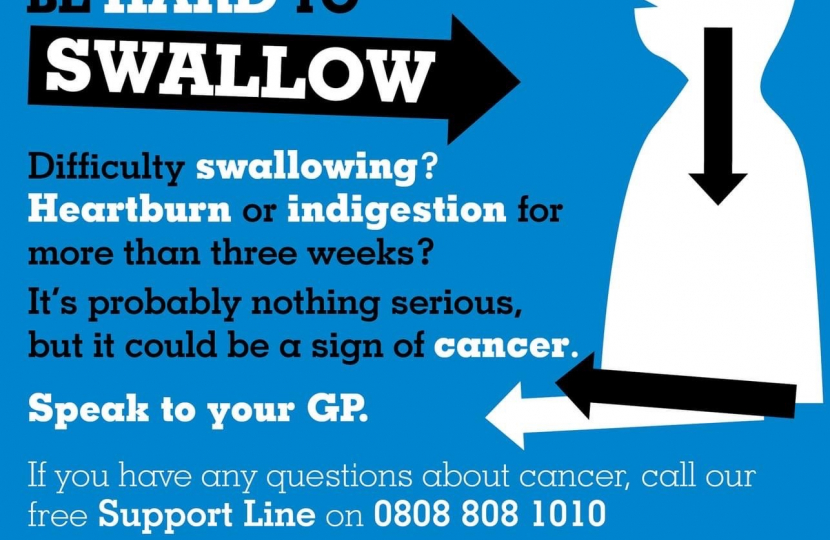
Cancer survival rates have improved significantly over the last 40 years and today approximately half of those diagnosed with cancer will live for 10 years or more after diagnosis. There are however, six cancers which remain a challenge when it comes to survival. These are lung, pancreatic, liver, brain, oesophageal and stomach, which together are referred to as ‘Less Survivable Cancers’.
These cancers account for a quarter of cancer cases in Wales but are responsible for half of all cancer related deaths. Four of these six Less Survivable Cancers are of the Upper-Gastrointestinal tract, and two of these, oesophageal and stomach cancer, have historically had very little public attention, but can have devastating consequences for individuals and their families.
Throughout February, which is also Oesophageal Cancer Awareness Month, Tenovus Cancer Care is running a campaign ‘Life Shouldn’t Be Hard to Swallow’ , urging people to look out for the main symptoms, which include heartburn and indigestion.
People diagnosed with Oesophageal and Stomach cancers have a shockingly low life expectancy, with only 43% of oesophageal cancer patients and 41% of stomach cancer patients in Wales expected to survive more than one-year post-diagnosis. By the time people are diagnosed, it is often in emergency settings when the cancer is at a later stage, with fewer treatment options.
Lack of awareness of the symptoms and risks make these cancers more deadly than others. A recent survey conducted on behalf of the Less Survivable Cancers Taskforce revealed only 1% and 4% of people asked in Wales recognised the symptoms of oesophageal and stomach cancer, respectively.
Like most cancers, early detection matters. As there is currently no UK-wide screening test available to detect early stage oesophageal and stomach cancer, a key to improving outcomes is knowing the symptoms. They are often vague and mistakenly attributed to other less serious and more common conditions.
Symptoms of oesophageal and stomach cancer include:
- persistent indigestion (3 weeks or more)
- prolonged heartburn (3 weeks or more)
- difficulty swallowing
- unexplained weight loss
- fatigue
- abdominal pain
- nausea and vomiting
There are a number of reasons you could be experiencing the symptoms listed, and it doesn’t necessarily mean you have cancer.
Although heartburn and indigestion are common ailments, it doesn’t mean they should be ignored. A GP can provide alternative or stronger treatments and help rule out any more serious causes of your symptoms.
The importance of catching these cancers early cannot be understated. If diagnosed at stage 1, one year survival for oesophageal cancer is 91% compared to just 21% at stage 4, when the cancer has spread. Similarly, if diagnosed at stage 1, one year survival for stomach cancer is 85% dropping significantly to 18% at stage 4.
Men are more than twice as likely to be diagnosed with oesophago-gastric cancers and socioeconomically deprived communities are disproportionately affected.
The outcomes for oesophageal and stomach cancer in Wales are really concerning. But we can see there is potential to improve survivability by increasing awareness of the symptoms.
I would encourage everyone to familiarise themselves with the signs and contact your GP or Tenovus Cancer Care for more information if they are concerned.
As part of its campaign, Tenovus Cancer Care has partnered with pharmacies in areas most at risk to display posters and materials. Pharmacists are encouraged to have conversations with customers who regularly buy medication to relive symptoms of heartburn and indigestion, recommending they consult their GP.
For more information on the campaign, visit: Oesophageal and Stomach cancer signs and symptoms (tenovuscancercare.org.uk)
If you’re worried about cancer, you can call the Tenovus free Support Line on 0808 808 1010.



